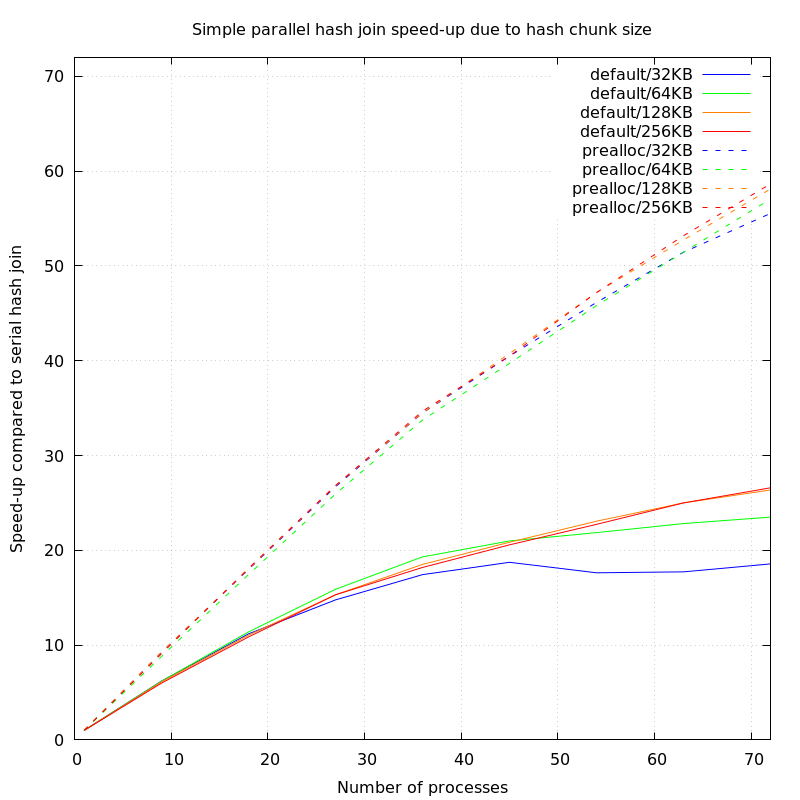Re: Fast DSM segments
| From: | Thomas Munro <thomas(dot)munro(at)gmail(dot)com> |
|---|---|
| To: | Robert Haas <robertmhaas(at)gmail(dot)com> |
| Cc: | pgsql-hackers <pgsql-hackers(at)postgresql(dot)org> |
| Subject: | Re: Fast DSM segments |
| Date: | 2020-06-19 05:42:41 |
| Message-ID: | CA+hUKGJO+dZGM70dqaE9a0=mjYOQmFsUV+c_gr_sNvYHVsfV=Q@mail.gmail.com |
| Views: | Raw Message | Whole Thread | Download mbox | Resend email |
| Thread: | |
| Lists: | pgsql-hackers |
On Thu, Jun 18, 2020 at 6:05 PM Thomas Munro <thomas(dot)munro(at)gmail(dot)com> wrote:
> Here's a version that adds some documentation.
I jumped on a dual socket machine with 36 cores/72 threads and 144GB
of RAM (Azure F72s_v2) running Linux, configured with 50GB of huge
pages available, and I ran a very simple test: select count(*) from t
t1 join t t2 using (i), where the table was created with create table
t as select generate_series(1, 400000000)::int i, and then prewarmed
into 20GB of shared_buffers. I compared the default behaviour to
preallocate_dynamic_shared_memory=20GB, with work_mem set sky high so
that there would be no batching (you get a hash table of around 16GB),
and I set things up so that I could test with a range of worker
processes, and computed the speedup compared to a serial hash join.
Here's what I got:
Processes Default Preallocated
1 627.6s
9 101.3s = 6.1x 68.1s = 9.2x
18 56.1s = 11.1x 34.9s = 17.9x
27 42.5s = 14.7x 23.5s = 26.7x
36 36.0s = 17.4x 18.2s = 34.4x
45 33.5s = 18.7x 15.5s = 40.5x
54 35.6s = 17.6x 13.6s = 46.1x
63 35.4s = 17.7x 12.2s = 51.4x
72 33.8s = 18.5x 11.3s = 55.5x
It scaled nearly perfectly up to somewhere just under 36 threads, and
then the slope tapered off a bit so that each extra process was
supplying somewhere a bit over half of its potential. I can improve
the slope after the halfway point a bit by cranking HASH_CHUNK_SIZE up
to 128KB (and it doesn't get much better after that):
Processes Default Preallocated
1 627.6s
9 102.7s = 6.1x 67.7s = 9.2x
18 56.8s = 11.1x 34.8s = 18.0x
27 41.0s = 15.3x 23.4s = 26.8x
36 33.9s = 18.5x 18.2s = 34.4x
45 30.1s = 20.8x 15.4s = 40.7x
54 27.2s = 23.0x 13.3s = 47.1x
63 25.1s = 25.0x 11.9s = 52.7x
72 23.8s = 26.3x 10.8s = 58.1x
I don't claim that this is representative of any particular workload
or server configuration, but it's a good way to show that bottleneck,
and it's pretty cool to be able to run a query that previously took
over 10 minutes in 10 seconds. (I can shave a further 10% off these
times with my experimental hash join prefetching patch, but I'll
probably write about that separately when I've figured out why it's
not doing better than that...).
| Attachment | Content-Type | Size |
|---|---|---|

|
image/png | 66.8 KB |
In response to
- Re: Fast DSM segments at 2020-06-18 06:05:50 from Thomas Munro
Responses
- Re: Fast DSM segments at 2020-06-19 19:17:53 from Andres Freund
Browse pgsql-hackers by date
| From | Date | Subject | |
|---|---|---|---|
| Next Message | Kyotaro Horiguchi | 2020-06-19 05:42:45 | Re: min_safe_lsn column in pg_replication_slots view |
| Previous Message | Kyotaro Horiguchi | 2020-06-19 05:35:11 | Re: min_safe_lsn column in pg_replication_slots view |